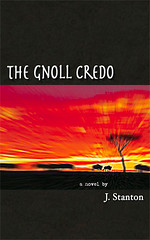 From an offline discussion about my novel The Gnoll Credo:
From an offline discussion about my novel The Gnoll Credo:
“There’s a lot to be found in very few words inside The Gnoll Credo—and that is precisely because I didn’t set out to write something deep or profound. I simply wrote down everything I knew about Gryka’s life, and how knowing her affected me—which gives the narrative a richness and verisimilitude totally lacking in polemics like (to pick two opposing examples) Ishmael or The Fountainhead.
“When an author sets out to make a point instead of telling a story, their characters are immediately demoted to the status of objects: bricks to construct metaphors, mouthpieces for polemic, puppets to perform a shadow play. The result may be clever and interesting, but it is rarely deep or profound, and almost never bears the sort of analysis you are bringing to the table. I believe this to be behind the postmodern obsession with authorial intent, though probably not consciously: when “characters” are almost always simple objects, all meaning flows from the author.
“In contrast, characters in a real narrative are autonomous entities. The narrative flows naturally from their actions. It contains the richness of their desires, fears, motivations, and history, not all of which will be explicitly stated in the text—and it can be analyzed on its own terms, as a description of events.
“This is a much richer ground in which to forage for meaning. To use a metaphor, “making a point” is agricultural. It can create one specific idea, very quickly…but anything else is pollution or a weed, and there is little to explore in a field of Roundup Ready soybeans. In contrast, “telling a story” is organic, wild, complex, forest and jungle and savanna and desert, a living community within which foraging can be very rewarding…
…for those with eyes to see.”


I just discovered this fact after three published novels and a fair amount of success. And it’s not just simply telling a story vs. making a point, though that is a very valid observation. There is also abandoning experimentation with form in favor of experimentation of perception and what is possible in reality. Ricker says that transrealism fiction is the most valid type of fiction, because it essentially mimics life more realistically by adding more dimensions in terms of what is and what could be possible in terms of human achievement, perception and our transreality. I read the first few pages of your novel and liked it very much. I will pick up a copy.
Darren:
You are absolutely correct that this essay only covers one axis of variation in the continuum of possible approaches to writing, which is multidimensional.
Damien Broderick has also pointed out to me that the transrealists use a similar approach—allowing plot to flow from characterization—and I’ve seen similar sentiments from Ray Bradbury. I believe that anyone who writes unforgettable characters must allow this to some extent, although I often read books where the narrator/protagonist is very real but the rest of the characters are yanked around like stage props. It’s much more difficult (and rewarding) to have two or more people in your head.
I’ve got a lot more to say about the similarities and differences between my approach and the transrealist approach (and the fiction that springs from it), but that will most likely become another essay in itself.
Thank you for your comments, and I look forward to your thoughts on the book! (Feel free to register for the forums: I love talking about writing, and these comment threads actually live in the forums.)
I enjoyed the few pages I saw and will buy the book, but I really prefer to have a kindle version, as I carry this around holding hundreds of books etc..can you say if or when you will market this in Kindle format ?
regards
BT
Ben:
My publisher and I are considering it, but there is no firm release date.
JS
[…] http://www.gnolls.org/477/on-writing-making-a-point-vs-telling-a-story/ […]
I don’t remember how I found your blog but I’m so glad I did. I ordered and read The Gnoll Credo this week. It is so clear. I have been systematically reading through your blog. Good stuff!
Marile:
Thank you!
As I've said many times, it's Gryka's book: I just wrote it down. I hope I've been able to communicate my own thoughts and ideas as clearly and bluntly as hers.
JS